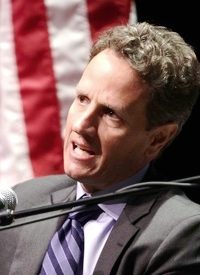
The United States would never, ever consider devaluing the dollar for export advantage, Treasury Secretary Timothy Geithner assured an audience of Silicon Valley business leaders in Palo Alto on October 18. “It is very important for people to understand that the United States of America and no country around the world can devalue its way to prosperity, to (be) competitive,” Geithner said. “It is not a viable, feasible strategy and we will not engage in it.” Geithner’s words appeared timed to allay concerns about the U.S. dollar before this weekend’s G-20 meeting in South Korea.
World leaders, especially among developing economies, have expressed concern for months over the slide of the U.S. dollar, accusing the Fed of printing too much money in its efforts to stimulate the recessionary U.S. economy. Holders of U.S government debt, especially governments like China, are concerned that the United States will try to inflate its way out of its gargantuan debt obligations.
In point of fact, Geithner & co. have been shamelessly devaluing the dollar relative to the world’s other fiat currencies for a couple of years, under the guise of economic stimulus. According to the false doctrine of Keynesianism, money — its quantity and speed of circulation — are the basis for a sound economy, instead of savings and investment. Central banks are therefore bound to constantly monitor and adjust the monetary spigots, while investors and ordinary citizens are expected to believe that the men having final say over the size of the money supply act always with restraint and with the best interests of all foremost.
In real life, of course, men entrusted with the ultimate power over a nation’s finances seldom act in anyone’s interest but their own, as the recent cascade of multibillion-dollar bailouts has amply illustrated. The United States is determined to continue printing money at any cost, to alleviate the pain brought on by decades of fiscal improvidence, and the rest of the world is expected to pick up the tab, depending on the say-so of our leaders that we will continue to honor our debts.
History shows that neither the United States nor any other country, no matter the historical stature of its currency, can be relied upon to honor its agreements. In the months leading up to Great Britain’s suspension of the gold standard in the early 1930s, British central banker Montagu Norman took great pains to assure foreign holders of pounds Sterling that the British Empire would never besmirch its honor by suspending gold redemption. On the very eve of the day Parliament took Great Britain off the gold standard (technically, the gold exchange standard, since after World War I, the privilege of redemption in gold was restricted to foreign investors), Norman was in the Netherlands reassuring its government that the pound Sterling would always be good as gold.
After World War II, it was the United States that controlled the world’s strongest currency, and the dollar — like the British pound a generation earlier — was on a gold exchange standard. The federal government had already broken its generations-old pledge to American citizens to redeem paper with gold when FDR suspended the gold standard and confiscated privately-held gold during the Great Depression. But under the postwar Bretton-Woods agreement, foreign holders of U.S. dollars could still redeem them in gold.
That pledge was broken in 1971 when President Nixon “closed the gold window,” plunging the world currency markets into turmoil and showing up the delusion that American leaders are any less capable of venality than their counterparts abroad. Throughout the ’70s, the U.S. dollar went on an inflationary tear that coincided with a severe recession and the worst economic malaise since the Great Depression. But Nixon — hamstrung by Vietnam War debts, among other things -— did what he believed he had to, as politicians always will when not retrained by strict limits on their power.
Now the world has returned to the financial climate of the 1970s and the 1930s, in which a severe recession has destroyed governments’ ability to service their debts by raising taxes, and the bad political habits of generations have entrenched vociferous special interests who fight tooth and nail to prevent reductions in subsidies, welfare payments, pensions, and other so-called entitlements.
Politicians being always and everywhere wont to follow the path of least resistance, printing money to cover epochal deficits is by far the most attractive short-term option. In the not-so-long run, however, this policy will also run aground on the shoals of economic law. Sooner or later, all the assurances of men like Geithner notwithstanding, foreign investors will figure out that the United States now carries a debt load that it will never pay off. A Gadarene rush out of the dollar will ensue, and long-feared hyperinflation with wreak havoc on the American body politic.
Blind to the coming come-uppance, however, Geithner assured his Palo Alto audience that the U.S. dollar will not be replaced as the world’s reserve currency, at least “not in our lifetime.” But setting up a new world reserve currency, as Keynes wanted to do long ago at Bretton-Woods, is very much part of the financial agenda in many precincts of international power, including the United Nations. A U.S. dollar on life support would doubtless help to create the political climate for a transition to a global currency issued by a world central bank.
As for the upcoming G-20 meeting, expect to hear more assurances that the United States will always be good for its debts, and more attempts to blame China for doing the same thing we’ve been doing for years. But in the end, the decision will be made for us, when market forces at last bring the international currency markets, including the U.S. dollar, into some semblance of reality.
Photo: Treasury Secretary Timothy Geithner gestures during a talk to the Commonwealth Club in Palo Alto, Calif., Oct. 18, 2010: AP Images



